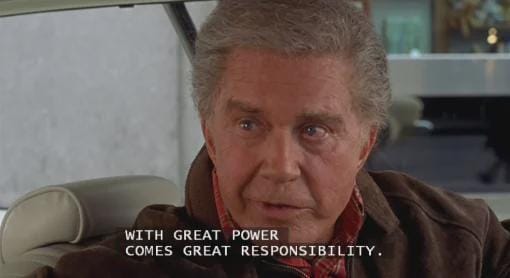This letter is going to be about influence.
Now - I'm not going to spend a lot of time convincing you WHY you should read it.
The main principle to consider is this…
If you are in any way responsible for someone else (family, employee, mentee, an audience, etc), then by definition you have a responsibility to lead them and lead them well.
I would argue that to dismiss the idea that you should learn and practice the art of influence is morally irresponsible…
Because being in leadership is not about being in charge, but more so being responsible for those IN your charge.
And as John Maxwell has said before,
"Leadership is influence. Nothing more, nothing less."
This means you have a moral duty to lead and therefore to influence.
Let's at least unpack what influence is and then the "how".
The essence of influence is to win someone into your way of thinking. This could be your perspective, your values, your principles.
This can be done with spoken words, written words, or often through actions.
This is also known as "leading by example", similar to how we are still influenced by leaders who have long since been away from this earth (Jesus for example, Lincoln, Wilberforce, Lewis, etc).
I will primarily focus on the written and spoken forms of communication, but keep in mind this is all pointless if you exhibit incongruence between your words and your actions.
Hypocrisy always comes to the light and wields very little influence for very long.
We all do to some degree, we're human, but it should be rare and quickly resolved once noticed.
Now - in order to influence others at the highest level, we must first answer this…
Why is it hard?
Why am I even writing on this topic in the first place?
Here's the answer…
Because people resist change.
It's not your ideas, people don’t resist your ideas.
They resist being CHANGED by your ideas.
This is called “psychological reactance", and it explains why so many struggle to create change in our spheres of influence.
When people feel like you’re trying to change their mind, their brain automatically activates defense mechanisms. They start looking for reasons why you’re wrong, why your idea won’t work, or why the status quo might actually be better.
Why wouldn't they?
Change is hard in and of itself… why would any of allow change being thrust upon us by someone who could and probably does have an agenda?
In order for someone to accept the idea and therefore the change, we must feel psychologically safe to do so.
There must be trust and the easiest way to do this is to showcase ALIGNMENT with your idea and their criteria for change.
In other words…
This is why the most influential people rarely try to influence anyone directly.
Instead, they create conditions where people influence themselves.
They understand that people don’t argue with their own conclusions.
Let me simplify this.
Real influence has three levels, and most people only operate at Level 1:
Level 1: Surface level
“Here’s what you should do”
“The data shows…”
“I think you should…”
Level 2: Emotional level
“How do you feel about this?”
“What’s your experience been?”
“What concerns you most?”
Level 3: Self discovery
“What patterns do you notice?”
“What would happen if…?”
“How would you explain…?”
Level 1 creates resistance and even if you bypass it, it doesn't create lasting change.
Level 2 can work, especially for temporary buy in but again rarely ever lasts.
Level 3 on the other hand creates lasting change.
Before you get too excited, let me warn you, even Level 3 can fail if you’re speaking to the wrong level of human motivation.
Do yourself and your future self a favor and learn what actually motivates us as human beings.
I'll make it simple for you.

The 5 Levels of Human Motivation
One of the benefits of paying your dues in sales is you quickly see at scale what we all respond to.
So I'm made it a point to take note and conceptualize what I've noticed makes us all "tick".
What exactly motivates us?
I've boiled down into to five levels.
Understanding these levels changes everything about how you lead and connect with people.
When you understand this hierarchy, you can speak to what truly moves people at their core.
I'll start at the lowest level and go up from there.
Level 1: Desires (surface level)
This is where most people operate, what we're all used to.
This is also the most obvious when someone is attempting to influence us.
This is motivation through external rewards and consequences.
In other words more money, more freedom, avoiding pain, gaining pleasure.
It’s transactional influence at best.
Sure, it works temporarily, but it’s the weakest form because it requires constant reinforcement.
The moment the carrot disappears or the stick stops hurting, the motivation dies and therefore your influence dies.
Level 2: Legacy (future self)
This is how someone wants to be remembered.
What do they want people to say at their funeral? What mark do they want to leave on the world?
This is more powerful because it connects to ego and significance which are fundamental human drivers.
When you help someone see how their actions today connect to the legacy they want to leave, you’re speaking to something much deeper than immediate gratification.
Level 3: Purpose (calling)
This is their sense of “why”. "Why" is always powerful.
What do they feel called to do in this life?
Viktor Frankl was right when he said humans can endure almost anything if they have a strong enough why.
When you can connect what you’re asking someone to do with their sense of purpose, you’re tapping into meaning.
Which is one of the most fundamental human needs.
You may not be conscious of it, but we all become very conscious of the LACK of it.
When we don't have meaning, we search and cope until we find it.
Level 4: Identity (core self)
This is who they believe they are at their essence.
The truth is, most decisions flow from identity.
People ask themselves, consciously or not, “what would someone like me do in this situation?”
When you can frame your influence around “You’re the kind of person who…” or "you've told me you want to be someone who…"
You’re speaking to the deepest level of personal motivation.
Identity is the foundation everything else builds on.
Level 5: Transcendent truth (worthy cause)
This is the highest level.
When I observe the most influential people of all time, I notice they didn’t necessarily speak to who people were in the moment…
But instead, to who they were created to be.
In order to do this, there has to be a worthy cause that's bigger than them or you.
Essentially, what this does, is makes the person they SHOULD be (which requires the uncomfortable change) to a cause that's WORTH it.
This is about connecting people to universal principles that transcend personal identity, to their divine nature, to something infinitely greater than themselves.
Think about Jesus for example.
Regardless of your religious stance, Jesus was so influential He started a movement that's still going today.
So much so that we changed how we measure time across history.
And He consistently connected who people COULD be to a worthy cause… to the extent that His twelve apostles were willing martyrs.
The Dynamic Relationship Between Purpose and Identity
Now - I don’t think this hierarchy is static.
It's way too complex to be.
Sometimes Identity and Purpose can swap positions, and understanding this dynamic is crucial.
I'll break this down too, so you can know how to navigate it.
Let's talk about why I put identity higher. Most commonly, I've noticed, it will be higher driver than purpose because identity operates almost unconsciously.
When someone says “I’m not the kind of person who does that,” they’re accessing something so core that it overrides logic, circumstances, even stated purposes.
Identity is what people will defend most fiercely.
However, not always the case.
Because purpose, on the other hand, answers the more fundamental question.
Identity asks “Who am I?” but purpose asks “Why do I exist?”…
And logically, why you exist should inform who you are, not the other way around.
However, not everyone is going to logically make this internal stance.
So whether or not purpose or identity is a higher driver I think comes down to their mental and emotional health.
For healthy people, purpose shapes identity.
They discover their calling and become the kind of person who fulfills it.
But most people aren't there yet, so therefore identity constrains purpose.
They stay trapped in “I’m just not that kind of person” paradigm.
So just remember, it depends on the person you’re dealing with:
If they have a strong sense of purpose, speak to that first. It’s their North Star.
If they’re more identity driven (most people), you have to work with their self concept first.
The more that you can internalize this and use it as a map for influencing those you are responsible for, the more influential you'll be.
I'll give you a framework you can use.

Step 1: Diagnose what drives them
Instead of just understanding their current reality, you need to understand what level of motivation they operate from:
Desire: They talk about outcomes, results, rewards
Legacy: They mention impact, what people will think, long term reputation
Purpose: They use language about calling, meaning, mission
Identity: They say things like “I’m the kind of person who…” or “That’s not me”
Transcendent: They reference principles, universal truths, serving something greater
Step 2: Find the gap
Once you know their primary motivation level, help them DISCOVER (you're not going to just tell them, remember we're helping them to discover it for themselves) limitations at that same level:
The key here is staying curious…
Turn any frustration into curiosity. Ask questions, listen, rise and repeat.
For identity driven people:
“Everything aside, ultimately, who do you want to be? How would they, handle this challenge?”
For purpose driven people:
“Ultimately, how do you feel this aligns with your purpose?”
For legacy driven people:
“When all of this is said and done, how do you want people to remember you?”
And in order to dig deeper, keep asking clarifying questions.
"Why is that?"
"Why is that important to you?"
"Can you tell me more about that?"
What would that look like for you specifically?"
Step 3: Bridge up
Once they see the gap, stay curious, and lead them up.
You're helping them to build a bridge.
From Desires to Legacy:
“What would this look like if you prioritized how you want to be remembered instead of just immediate results?”
From Legacy to Purpose:
“Beyond how you want to be remembered, what do you feel called to do?”
From Purpose to Identity:
“Who do you need to become to fulfill this purpose?”
From Identity to Transcendent:
"Ultimately, what cause do you feel you stand for?"
“How do you feel this impacts those around you?”
"Why is that important to you?"
Step 4: Co-create the path forward
At this stage, co-create the path with them.
Keep leading them, bit by bit, so that they are discovering the path and making commitments at the level that actually moves them.
This is powerful because they won't feel like you thrusted change upon them, but instead you helped them to see how to become who they want to be.
You helped them gain clarity.
I want to address the importance of values within this.
An old mentor of mine asked me:
"Mitchell, would you rather be right or would you rather be rich?"
Honestly, the rich part didn't motivate me as much as the question made me re evaluate how much value I put on being right.
I realized, it has very little value in the grand scheme of things.
Remember when I said people don’t resist your ideas, they resist being changed by your ideas?
This whole framework I’ve given you, sidesteps that resistance by making the change their idea.
When someone discovers a gap in their current thinking, they own that discovery.
When they envision a better future state, it becomes their vision.
When they choose to move forward, it’s their choice.
You’ve simply created the conditions for them to see what was already there.
And let me tell ya… most leaders don't do this, not even close.
Usually because they value being right more so than they value being influential.
They think influence means…
Having the best arguments
Presenting the most compelling data
Being the smartest person in the room
But ultimately it looks like:
Understanding how people think
Creating the environment for them to question their assumptions
Helping THEM discover better options at the level that actually moves them
Big caveat
I have to mention this or else I wouldn’t feel right about even teaching this.
I called this “dangerously influential” for a reason.
When you understand how to work with human psychology this way, it's powerful.
And as Uncle Ben taught us…

"With great power, comes great responsibility."
(Thanks Stan Lee)
The same frameworks that can help someone discover a better path can also be used to manipulate people into choices that serve your interests instead of theirs.
The difference is intention.
An issue of the heart.
Moral influence seeks to expand someone’s options and help them make better decisions for themselves.
Manipulation seeks to limit someone’s options and get them to make decisions that serve you.
“Do nothing out of selfish ambition or vain conceit. Rather, in humility value others above yourselves.”
Use these capabilities to serve others, not to serve yourself.
Lastly, remember this is a skill to be developed.
Practice this approach until it becomes unconscious competence.
Stop thinking about “how to convince people” and start thinking about “how to help people think better.”
Watch what happens.
Most likely, you’ll be amazed at how much more open people become to ideas they would have resisted if you’d led with them.
And stay consistent.
You’ll know you’ve mastered this when people start thanking you for conversations where they did most of the talking.
When they say things like “That really helped me think through this” instead of “Thanks for the advice.”
When they implement changes with enthusiasm instead of reluctant compliance.
When they give you credit for insights they actually discovered themselves.
That’s when you become dangerously influential.
Till next time,
- The Miles Memo

-Mitchell Miles - CEO
Tech moves fast, but you're still playing catch-up?
That's exactly why 100K+ engineers working at Google, Meta, and Apple read The Code twice a week.
Here's what you get:
Curated tech news that shapes your career - Filtered from thousands of sources so you know what's coming 6 months early.
Practical resources you can use immediately - Real tutorials and tools that solve actual engineering problems.
Research papers and insights decoded - We break down complex tech so you understand what matters.
All delivered twice a week in just 2 short emails.




